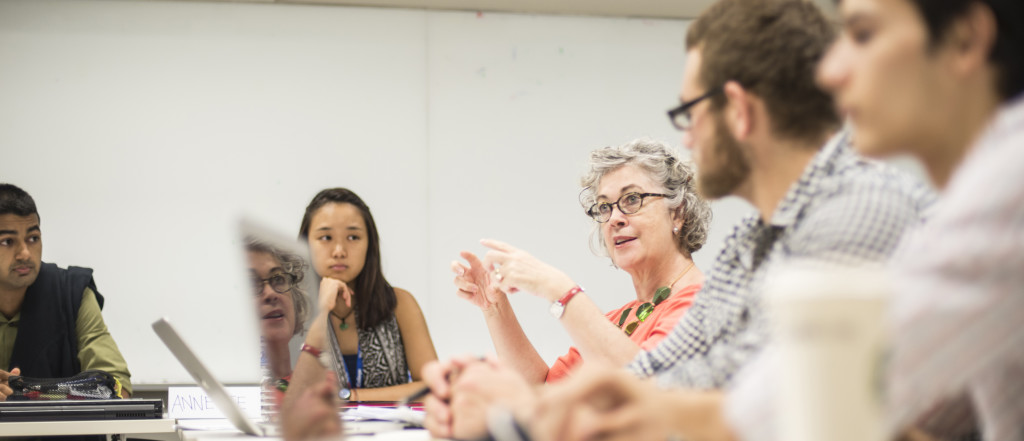Director, Division of Social Sciences and Head of Urban Studies, Professor Jane Jacobs, Elected as British Academy Fellow
By Daryl Yang | Image by Weave for Yale-NUS College

On 15 July 2016, Director, Division of Social Sciences and Professor of Urban Studies, Professor Jane Jacobs, was elected by the British Academy as one of 20 new Corresponding Fellows from overseas universities, in recognition of her outstanding contribution to research in urban and cultural geography.
The British Academy is the United Kingdom’s national body for the humanities and social sciences, with a fellowship of around 1,300 leading national and international academics elected for their distinction in the study of peoples, cultures and societies, past, present and future.
As Fellows are nominated by their peers, Professor Jacobs shared that the news came as a complete surprise. “I had no idea that this was happening. I can only surmise that this was the outcome of existing Fellows of the Academy nominating a peer whom they think is worthy of recognition as a Fellow and I am very honoured to be so recognised.”
Professor Jacobs added that the nomination by her peers could have arose from her research which has contributed significantly to the field of urban studies. Trained in geography, she has explored the interface between cultural and urban geography. Taking a multi-disciplinary approach to her own research, Professor Jacobs applied her expertise in human geography to questions in urban studies.
Her early research focused on indigenous rights and cultural property. She published on the postcolonial politics of cities, including her monograph Edge of Empire: Postcolonialism and the City (1996), which examined the struggles over urban space in three contemporary First World cities, in an attempt to map the real geographies of colonialism and postcolonialism.
“The book and my research reflected a question that was very alive at that time – how do cities incorporate the interests of deeply marginalised groups in the way they structure and plan public spaces and developments?” Professor Jacobs shared.
Her more recent work is closer to her current home in Singapore, focused on high-rise housing knowledge and infrastructures, comparative urbanism, and the relationship between architecture and society. Professor Jacobs sought to move away from the thinking of buildings as simply infrastructure, and to instead consider the relevance of social relations.
“I started to think about buildings not just as symbolic things but as something that works in conjunction with people and their lives.” she revealed.
Based on that thinking, Professor Jacobs studied two high-rise buildings, one in Singapore and one in Glasgow. The research culminated in the publication of A Geography of Big Things published in 2006, which introduced a new wave of scholarship and thinking about architecture in an urban environment.
Also borne out of her love for architecture was her book, Buildings Must Die: A Perverse View of Architecture, published by MIT Press in 2014, which she co-authored with her husband Stephen Cairns. Challenging the common notion by architects that buildings are works of art, her book contends that buildings often do not last forever, and architects now need to consider their work in collaboration with other city builders, and how buildings must be designed to change.
Being elected as a British Academy Fellow is a prestigious recognition for Professor Jacobs, and an affirmation from peers within the discipline about the importance of her work to the field. Professor Jacobs’ scholarship and her influential research work have been grounded in her constant questioning of why the environment we live in means things and matters to us. She hopes to also imbue in students this critical thinking about the world.
A member of the inaugural faculty at Yale-NUS College, Professor Jacobs has been an integral part of the development of the Urban Studies major in the College and is using her rich understanding of the field and its links with architecture, to enrich the major in a way that would best benefit student learning. She sought to develop the Urban Studies major largely as a social science programme, but with a studio culture, which is usually more common in architectural programmes. This meant that students had more hands-on experience, and were in closer proximity to their professors, as compared to a traditional classroom setting.
As an example of how they sought to make classes multi-disciplinary and interesting, Professor Jacobs shared, “The Urban Spatial Reasoning class offered last semester was especially interesting for faculty, as that module combined Science, Social Sciences and creative thinking. Students had both a productive and creative moment in the modelling and production of fabricated installations of their sample areas as well as a diagnostic and analytical experience where they had to learn to grapple with technologies involving the computer-based Geographical Information Systems (GIS) and computational modelling.”





